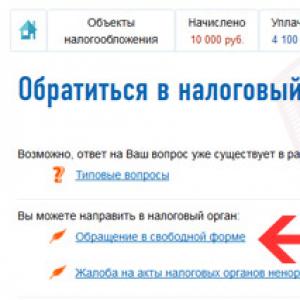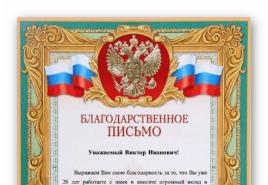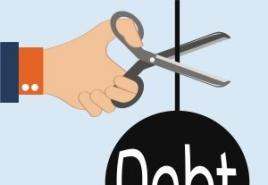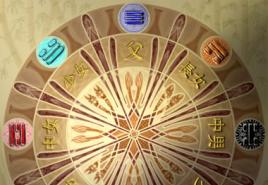Strict prohibitions on Peter's Fast: even if you are not fasting, it is strictly forbidden to do so. What not to do during Lent
The products that are prohibited from being eaten during fasting are all products for the production of which raw materials of animal origin were used. First of all, the ban applies to meat and any meat products, as well as poultry and eggs. Milk and everything connected with it are prohibited: butter, sour cream, cottage cheese, fermented milk products and drinks, cheeses. During fasting, it is prohibited to eat pasta, white and rich bread, cakes, cookies, waffles and any pastries that contain butter, eggs and milk. Don’t forget, there is also mayonnaise, because eggs are also used to prepare it.Some foods such as fish and vegetable oil, can be eaten only on those days of fasting that are considered non-strict, although vegetable oil is not of animal origin. The ban also applies to chocolate and fast food, which are high in fat. Cannot be used during fasting alcoholic drinks, including beer.
Post by day of the week
On some days of the week, fasting may be more strict, and on some days, including those falling on Sunday, some relaxations may be allowed. So, Monday, Wednesday and Friday are days of strict fasting and dry eating. On these days, you can only eat foods that have not been subjected to heat treatment; adding vegetable oil is also excluded. On days of strict fasting, you can only eat black bread, vegetables and fruits, washing them down with water or unsweetened compote. If you are making salads these days, you can only use lemon juice mixed with a little honey for dressing.You should not go hungry while fasting, especially if you have not denied yourself food before. This is fraught with problems with bile secretion and erosive processes in the gastrointestinal tract.
Hot dishes can be eaten on Tuesdays and Thursdays, but on these days it is prohibited to add oil to them. But Saturday is the day of relaxation, when you can finally fry fish or vegetables in vegetable oil and add it to salads.
Proper nutrition during fasting
And during fasting, your diet can be healthy. Replace any animal protein missing in your diet with products that contain plant-based proteins. First of all, these are mushrooms and legumes: lentils, peas, chickpeas. The missing fats are found in nuts, and iron in apples, buckwheat, and bananas.Remember that while observing religious fasts, you should not immediately fall into the sin of gluttony upon completion; this is harmful not only to the soul, but also to health.
Mayonnaise, which contains both butter and eggs, is not allowed as a sauce, so it is best to dress salads soy sauce or lemon juice.
It is forbidden to drink any alcohol, despite the fact that in natural recipes it must contain vegetable matter. This is due to the fact that fasting is primarily a cleansing of the soul, and not, and alcohol for a person is an excess, not a necessity.
note
The exception regarding fish concerns only Palm Sunday and the Annunciation. Fish is allowed on these days.
The diet of a nursing mother should be complete, including foods high in vitamins and microelements that are vital for a newborn baby. However, there are a number of restrictions in the mother’s diet, since not all foods will benefit her and her newborn baby.

Reasons for refusal
A mother who is breastfeeding should follow a special diet recommended by pediatricians and based on many years of experience of previous generations. Otherwise it may affect the child. Excessive consumption of certain foods can cause allergic dermatitis, popularly called diathesis, infant colic and increased gas formation, as well as poor health and often of the mother herself.Most strict dietary restrictions apply to the first month of a child’s life. Over time, new products can be gradually introduced.
First of all, keep in mind that each baby has its own individual reaction to foods in the diet. What is well tolerated by one will cause problems for another.
Dairy and fermented milk products
One of the most common pieces of advice that women who have recently given birth hear is to be sure to drink cow's milk. No less often, in order to increase lactation, it is advised to drink several cups of black tea with condensed milk every day.If you like to drink tea with herbs, you should not get carried away with sage, it reduces lactation.
Maybe these drinks will actually increase the amount of breast milk and make it taste sweeter. The pitfall is that a fairly large percentage do not tolerate cow's milk protein well in the first months after birth. This is biologically determined and is not a disease. If you notice your baby has rashes on the face and body, a yellow seborrheic crust on the head or other allergy symptoms, reduce the amount of milk consumed. Fermented milk products, cottage cheese, and sour cream are considered more acceptable in the mother’s diet.
Confectionery
All sorts of sweets like cakes, sweets, pastries, etc. should also be limited, ideally completely excluded from the diet. Confectionery products often contain harmful transgenic fats, margarine and artificial additives. In general, try to reduce the amount of food with chemical colors and preservatives and eat natural foods.A pediatric nutritionist or breastfeeding specialist will help clarify the situation regarding the effect of foods on a particular child.
Products that cause allergies
The nursing diet should be hypoallergenic. Allergies are often caused by products containing cocoa beans (cocoa, chocolate, candies). Use large quantity eggs, nuts, honey, canned food, citrus fruits and berries can cause allergic reaction. You should also not overuse fresh vegetables and fruits, especially if you often have digestive problems.Avoid drinking too much carbonated drinks and coffee.
Alcohol abuse during lactation
The most important rule that a nursing woman must follow unquestioningly is the absolute exclusion of alcoholic beverages! Drinking alcohol in 100% of cases affects the composition and quality of breast milk; alcohol enters the child’s body and can affect its motor development.Medicines and breastfeeding
Majority medicines are also prohibited. Before taking any pill, read the instructions carefully. In the vast majority of cases, the lactation period is included. If you are sick, it is best not to risk it, go to see a doctor and get advice about taking certain medications in your chest.Video on the topic
Sources:
- Products prohibited during breastfeeding
On Monday, February 19, Lent began for the Orthodox. For exactly 48 days, believers must abstain from animal food. But the main thing during Lent is not abstaining from food. The meaning is different. What can and cannot be done by those who decide to fast, read in our “Question and Answer” section.
How is fasting different from dieting and vegetarianism?
Some people decide to fast “for company” or “out of curiosity” and give up meat, dairy products and alcohol for 48 days. But fasting is not primarily abstinence from food, but spiritual cleansing. A person gets rid of sins and passions, learns to sacrifice himself, and shows humility. Lent is a time when Orthodox Christians take care of the soul, not the body.
At this time, a person must truly work to change his soul. So during fasting it is necessary not only to give up animal food, but also from entertainment activities, social networks, TV and so on. Go to church, read the Bible, spend more time with your family.
The main thing in a diet is to give up any food, reduce the number of calories and lose weight. Vegetarianism also has nothing to do with fasting. The main idea here is that killing a living being is an imprint on karma. Moreover, vegetarianism is a year-round concept.
Is it possible to baptize children during Lent?
Children and adults can be baptized at any time, including during Lent.
Is it possible to play sports during fasting?
The question is ambiguous. Sport itself is not prohibited during Lent. However, some representatives of the Russian Orthodox Church They believe that at this time it is better to engage in soul-searching, and physical activity can be postponed. If you are a professional athlete and this is primarily work for you, then you can leave training.
If you come to fitness centers for socializing, beautiful photos and entertainment, then the opinion here is clear: it’s better to forget about it until the end of the post.
But when it comes to health, for example, rehabilitation after surgery or injury, then physical exercise are not prohibited.
Is it possible to smoke during Lent?
No, smoking is an addiction, an indulgence. If you are a heavy smoker, then the beginning of Lent is the time to give up smoking once and for all.
Is it possible to go to a cemetery during Lent?
As for the desire to visit the deceased in the cemetery during Lent, there are no strict prohibitions. The Church has set aside special days for the remembrance of the dead, they are called “Parents’ Saturdays.” They are also needed so that the living do not forget about the dead.
Related materials

Why do people give up meat, eggs and dairy products during Lent?
Our ancestors did not serve meat on the table every day. This dish was prepared on holidays. Therefore, giving up animal products was equivalent to giving up self-indulgence for people.
Who should not fast?
It is forbidden to fast for children, the elderly, or people for whom refusal of certain foods could harm their health or aggravate their illness. Contraindications for fasting include illnesses gastrointestinal tract, gastritis, cholecystitis, pancreatitis, enteritis and many other diseases.
Related materials

Are there any concessions for travelers?
Yes, travelers can deviate from the rules; they are allowed to eat animal products. However, historically, indulgence was given to wanderers due to the fact that it was difficult to find food on the road. Today, finding lean food when traveling is not so difficult.
Is it possible to have sex during fasting?
Intimate relationships during Lent are a very delicate and personal issue. Fasting involves abstaining from married life. But here both partners must agree to abstain. If a couple does not know what to do, then they should seek help from a spiritual mentor.
Fasts can be one-day or multi-day. Wednesday and Friday are considered one-day fasts, as well as three fasts “in number” - on the Exaltation, on the day of the Beheading of St. John, and on Epiphany. There are four multi-day fasts: Great Lent, Petrovsky Lent, Nativity Lent and Assumption Lent. There is an opinion that fasting only involves abstaining from food. But that's not true. Let's look at what you can't do during fasting in order to spend it correctly.
Entertainment
During Lent you cannot indulge in fun, go to entertainment events, sing, have fun, dance, attend concerts, film screenings, shows. It is also not recommended to organize holidays yourself; this applies to feasts for weddings, birthdays, anniversaries, housewarmings, celebrating passing exams or receiving diplomas, seeing off the army, etc. It is forbidden to use foul language or gossip.
Alcohol
In accordance with the diet, alcohol is not prohibited during fasting; it is not of animal origin. But drinking is always associated with merry revelry, so priests do not recommend drinking it during Lent. But if you drank a glass of vodka at a wake, it is not forbidden. By the way, the church also considers smoking a sin, so during Lent it’s time to quit this bad habit.
Marital responsibilities
The next requirement on the list of what not to do during Lent is abstaining from sexual relations. IN modern world This requirement is considered practically impossible, but in pre-revolutionary Russia it was strictly adhered to. This requirement is connected with the fact that during fasting the soul must be liberated from everything that enslaves it. And sex is considered one of the addictions that deprives a person of will.
Despite the fact that food restrictions are an important component of Lent, its true meaning is not fasting. In order to observe the strict and long fast before Easter correctly, you must not only limit yourself in nutrition, but also take care of your spiritual life. Otherwise, it will not be fasting, but a simple diet.
What you cannot do during Lent 2019 includes not only the ban on eating animal products. During the period of Lent, every believer must limit his pleasures and behave humbly in order to strengthen his faith.
The purpose of Lent is not just to get rid of extra pounds, but to distract from extraneous thoughts about one’s own pleasure, including thoughts about food, in favor of thoughts about God. Man, according to church teachings, consists of body and soul. The priests say that when one thing weakens (during the period of fasting, this is, of course, the body), then another strengthens.
This is interesting! Many people who fast emphasize that this period really has a beneficial effect on the body. The mind is enlightened, lightness appears in the body. 
It will be difficult for beginners to endure fasting, especially when they learn what not to do during fasting. But it is possible, after fasting, step by step, a believer will move towards good. It is also necessary to remember that fasting is not necessary for pregnant and lactating people, old people and sick people, as well as children who have not yet reached the age of fourteen.
What not to do during Lent
* Smoking and drinking alcohol (only a glass of red grape wine is allowed on Saturday and Sunday);
* Use foul language, gossip, utter indecent words;
* Limit pleasures. Watch less TV, stop going to the cinema and cafes;
* Observe marital abstinence. Spouses can only kiss each other in the evening;
* Avoid eating animal products. This includes meat and fish, all dairy products, eggs, sweets, pastries and bread. Fish can only be eaten on special occasions. church holidays, falling during the Lenten period: Annunciation and Palm Sunday (April 7 and 21, respectively). it is allowed to eat fish caviar;
* Show off to others. Especially to brag about the fact that a person is fasting. This is the internal decision of every believer and you should not show it off, showing your pride;
It is necessary to understand that the list of what cannot be done during Lent applies in full to clergy. For the laity, some concessions are allowed in observing Lent, especially with regard to nutrition. But any concessions must be discussed with the priest in the church and received his blessing.
It is clear that during Lent, which in 2019 must be observed from March 11 to April 27, there are not only prohibitions. There are also rules that must be done during this period. 
What to do during Lent
* While watching TV in the evening, you can read religious literature: the Gospel, the Psalter or the lives of the saints. This way you can expand your understanding of faith and the meaning of life. Find specific wise recommendations for improving your spiritual and family life. Most religious books are adapted to modern times; they are considered easy and interesting in content.
*Go to church. During the period of Lent it is obligatory to do this. At least once during this period you must confess and receive communion. If abstaining from food cleanses the body, then these religious rituals help cleanse the soul. On Parents' Saturdays, which fall this year on March 11, 18 and 25, you need to go to church and light candles for the repose of the dead.
* Giving alms. They say that giving alms to the poor and needy in this world helps our deceased relatives in heaven. When a believer gives alms, he can ask the sufferer to pray for the health of a deceased relative.
* Do good deeds. You can feed animals and birds, give old things to orphanages, and make donations.
The list of what not to do during Lent 2019 is impressive. But you won’t be bored during this period, because the list of things that need to be done is also long. The period of fasting is a time of purification of body and soul; a person should strive for improvement and try to develop spiritually and strengthen his faith. This is precisely the true meaning of fasting, which should never be forgotten. Simply giving up certain foods without working on the spiritual side of life is called a simple diet.
Any fast, if done correctly, brings only benefits to the body.
However, many still perceive fasting as a kind of punishment, which is fundamentally wrong.
If you know how to eat properly during Lent, then this period will fly by for you.
In addition, you will be surprised how many interesting and varied dishes you can prepare during Lent.
Fasting for Orthodox Christians - what is it?
Fasting is a temporary, voluntary restriction or complete refusal of fast food, as well as a struggle with one’s passions. At this time, you need to refrain not only from fast food, but also from attending entertainment events and establishments of this kind. This is our gratitude to God for his great Sacrifice. Fasting is a kind of treatment that is designed to pacify and lighten the body, as well as disarm passions and curb desires. That's all today more people they try to keep fasting, but, unfortunately, many perceive it as a diet, which is fundamentally wrong. Fasting is much more than just not eating. As John of Damascus wrote: “If fasting was all about food, then cows would be holy.”
In fasting, as in everything else, you need to know when to stop. There is no need to rush from one extreme to another. Before you start fasting, consult your confessor or priest. And of course, fasting should not be a shortcut to the hospital.
In Orthodoxy there are four multi-day fasts:
Great, Petrov, Assumption and Nativity fasts.
Wednesday and Friday.
One-day posts:
Fasts are appointed on the eve of any holiday or in honor of it.
Lent gives every Orthodox person the opportunity to prepare for Easter. Christ prayed in the desert for forty days, after which he was betrayed and suffered martyrdom on the cross, thereby saving the entire human race from sin. The Orthodox, observing this fast, seem to walk this entire path together with Christ. This is one of the strictest fasts.
When the Holy Spirit descended on the apostles, they dispersed to preach the Gospel throughout the world, constantly being in labor, prayer and fasting. In honor of this event, it was appointed Petrov post. After all, every Orthodox person must preach the Orthodox faith with his life.
Dormition post dedicated to the Virgin Mary. It allows all Orthodox Christians to prepare for the great feast of the Assumption Holy Mother of God, who, preparing to meet her Son, prayed and fasted a lot. This post is equal in severity to the Great Fast.
Christmas post- the last one of the year. It was established so that every Orthodox Christian cleanses his soul through fasting, repentance and prayer. We must meet the Savior who came into the world with a pure soul and heart in order to show our desire to follow the teachings of Christ.
How to fast correctly: rules, behavior, church attendance
There are several basic rules that should be followed to understand how to fast correctly.
1. Before you start fasting, you need to understand that abstaining from food is a tool with which a person fights his sins. You need to abstain from food, and not exhaust yourself and your body. You must soberly assess your strength depending on your preparation for fasting and your state of health.
2. Fasting requires gradual entry and preparation. Start preparing for it by abstaining from fast food on Wednesdays and Fridays throughout the year.
3. For those who wish to fast for the first time, it is recommended to first talk with the priest, tell him about your physical and mental state and ask for a blessing to observe the fast.
4. It is advisable to attend all church services that take place during Lent. However to modern man It is quite difficult to follow this rule, especially for those who constantly work. But still, try to attend the evening service on Saturday and, of course, Sunday services.
5. During Great Lent, and now other Lents, the sacrament of Unction is performed in churches, which no Orthodox person should miss if he decides to fast. The time of this sacrament must be known in advance, since in different churches it is carried out at different time. After the rite of Unction, at the first opportunity it is necessary to take communion.
6. Simply abstaining from food without prayer will not benefit the soul. Moreover, it can be harmful if a person, abstaining from fast food, begins to rise above others. During Lent, an Orthodox person should devote himself to prayer, abstaining from passions and vices, repentance, doing good deeds, forgiving offenses, watching less TV and attending entertainment events.
7. B Lately More and more often the statement began to be heard that it is supposedly not necessary to abstain from fast food, the main thing is to do good deeds and not offend anyone. It may be true, but it is impossible to humble your spirit without measuring your body. As mentioned above, you should not go from one extreme to another. Abstinence and good deeds during fasting should be inseparable.
8. Lent is a time of reconciliation. Try to improve relationships with your friends and loved ones if you were previously in conflict.
9. In addition to abstaining from food, every Christian should concentrate his energies on good deeds. Do your best to help everyone in need. This can be not only a material sacrifice, but also your work and care for those who need it.
10. Every person knows about his weaknesses. Fasting is exactly the time when you can start fighting them. For example, try to overcome bad habits. Of course, this cannot be done without prayer. Devote every free minute to prayer and reading the Gospel.
How to eat properly during Lent: when and what can you eat?
There are several types of fasting:
— strict fast– refusal of any food and drinks, except simple drinking water;
— xerophagy– eating plant foods in their natural form, without cooking them;
— eating boiled food- it is allowed to eat plant foods, having previously prepared them, but without seasoning them with oil;
— eating boiled food with oil— it is allowed to cook vegetable foods with the addition of vegetable oil;
— eating fish– not only cooked plant foods are allowed, but also fish and seafood.
The Church clearly defines what nutritional rules must be followed on certain days. Let's look at them in detail for each multi-day post:
1. Lent.
The first and Holy Weeks of Lent are the strictest fasting; only raw food without oil or complete abstinence from food is allowed.
Monday, Wednesday and Friday – raw vegetables.
Tuesday and Thursday - dishes without oil. Boiled dishes from vegetables, legumes, mushrooms and cereals.
Saturday and Sunday – adding oil is allowed. Boiled or steamed foods.
Annunciation of the Blessed Virgin Mary - fish dishes are allowed.
Lazarus Saturday and Palm Sunday - fish caviar and boiled dishes with butter are allowed.
Good Friday - complete abstinence from food until the removal of the shroud.
2. Petrov post.
Throughout Lent, with the exception of Monday, Wednesday and Friday, you can eat fish dishes.
Monday – preparation without oil. Hot dishes.
Wednesday and Friday – raw food diet.
On other days, you can cook dishes with the addition of oil. Mushroom, vegetable, fish dishes and porridges.
Nativity of John the Baptist - fish dishes are allowed.
3. Assumption Fast. The duration of the fast is only two weeks, but in severity it is equal to the Great Fast.
Monday, Wednesday and Friday – raw food diet.
Tuesday and Thursday – cooking without oil. Boiled dishes from cereals, legumes, vegetables and mushrooms.
Saturday and Sunday – cooking boiled dishes with butter.
Transfiguration of the Lord - fish dishes are allowed.
4. Nativity Fast. Until December 19, the rules for eating are the same as the rules during Peter's Fast.
On the days of the feasts of St. Nicholas and the Entry into the Temple of the Blessed Virgin Mary, fish dishes are allowed.
Fish is prohibited in last week post.
On Wednesday and Friday, Orthodox Christians fast, remembering the betrayal of Judas and the martyrdom of Christ.
Of course, it is very difficult to follow all these rules, especially for those who decided to fast for the first time. Therefore, before each fast, it is necessary to communicate with the priest and take his blessing.
Foods that should not be consumed on any fasting days:
- any meat and offal;
- animal fat, margarine and butter;
— fermented milk and dairy products;
- mayonnaise;
- fish and seafood (except on certain days when this is allowed).
Products that are allowed to be consumed during fasting:
- fruits and vegetables;
- greenery;
- vegetable oil;
- cereals and cereal flakes;
- herbs and spices;
- legumes;
- Soy meat.
As you can see, during Lent there is quite a large selection of products from which you can prepare many tasty and healthy Lenten dishes.
How to fast correctly during Lent: who can be allowed relief
There are certain categories of people who are allowed some relaxations in fasting, or who are not recommended to fast at all. These categories include:
1. Children under 7 years of age. At this age, the body is actively developing, so do not exclude fish and meat from your child’s diet. You can replace some of these products with vegetable proteins: buckwheat, legumes, nuts and mushrooms.
2. Pregnant and lactating women. Women during pregnancy and breastfeeding are allowed to eat eggs, dairy products and fish.
3. People who have suffered serious illnesses. To restore strength, such people need amino acids and fats.
4. People suffering from chronic diseases.
5. Travelers and people who work hard physically.
If you are fasting for the first time, you can give yourself some slight indulgences by consulting with a priest first.
If you didn’t keep your fast: what punishment should you give yourself?
This question torments those who tried to keep the fast, but at some point broke down. In fact, only your priest can give you a punishment for this. He may assign you to read the Canon of Repentance for several days, or to perform certain work, for example, caring for the elderly or sick people. That is, to atone for this sin with some kind of good deeds.
In fact, observing fasting is very individual. Even if you give up, for example, only meat, this is already good. After all, one person has enough willpower to immediately hold a strict fast, but another will not be able to do it, and he will begin to grumble. Today you will give up meat, and by the next fast you will give up milk. If it’s easier for you, you can gradually give up fast food.
Posting calendar for 2016
Every Wednesday and Friday, except Weeks.
Now you know how to fast correctly. Begin your feat by fasting on Wednesdays and Fridays. Today on the Internet you can find a lot of interesting recipes for fast days. And remember that simply abstaining from food, without limiting yourself in anything else, is not fasting, but a diet! Enjoy your post!







